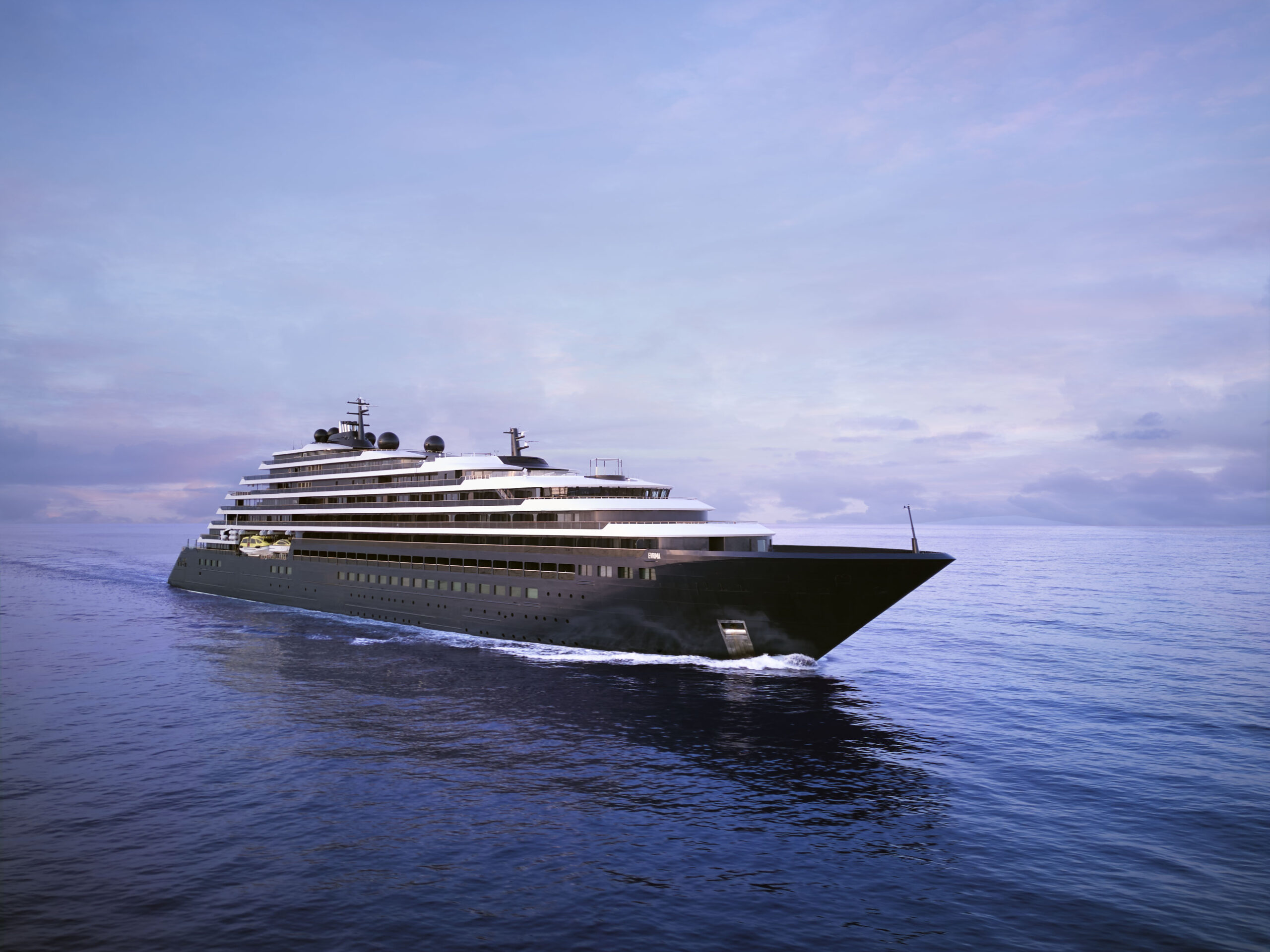WAR for the luxury travel market has erupted on a new front – the upscale yacht cruise sector. The past four months has seen three luxury hotel brands enter the segment, one debuting its first-ever ship, and another two announcing plans shortly thereafter that they would be building their own.
Ritz-Carlton was the first of the chains to announce a foray into the booming cruise sector, when, in June 2017, it confirmed plans to introduce three small-scale vessels from 2019. Luxury is exclusivity as much as it is opulence, and high-end travellers want to spend time away from the crowds – what better way to do so than to board a yacht and forget the throngs even exist.
In the end, the long-awaited debut of Evrima (pictured above) had to wait until this past October, due to factors including the COVID-19 pandemic. The cruise line officially debuted to the revelation by its Chief Executive Officer Douglas Prothero that devotees to the parent company, some of whom had never cruised before, were heavily booking the new product.

Barely three months after Evrima sailed on her first cruise, Accor announced it was adapting its historic ‘Orient Express’ brand to the high seas, with Orient Express Cruises set to sail in 2026. Accor has ordered two ships for its new cruise line – Orient Express Silenseas, which will set sail in the northern spring of 2026, and another ship, which will be delivered in the first quarter of 2027.
Just last month, Aman Resorts followed their two upscale adversaries into the space, announcing a joint venture with Cruise Saudi for ‘Project Sama’, which is expected to launch in 2026. The project’s links to the new Public Investment Fund-backed Cruise Saudi arm suggests the Kingdom will play a large part within the new cruise line’s product, as it plays monkey see, monkey do with its neighbours such as the United Arab Emirates and Qatar.

At a time when luxury travellers are both keen yet cautious, what is spurring so many high-end hotel chains to drop massive investments to follow each other into a largely unproven market?
“I don’t think anybody who’s in that ultra-luxury space wants to be left behind,” former luxury cruise line head Steve Odell told travelBulletin.
The cruise industry veteran, who during his career led luxury brands Silversea Cruises and Regent Seven Seas Cruises (RSSC), believes that, like any market leader, brands such as Ritz-Carlton, Accor, and Aman are all anticipating the future direction of the space they occupy “I genuinely think there is a gap in the market for this kind of experience,” Odell said.
“It’s sort of in between the luxury sector and private yachts, and it’s a client in my view that sits above the luxury market,” he added. So were he still in charge of a cruise line such as Silversea or RSSC, Odell would be unbothered by the developments of the past few months.
“The kind of people that go to those experiences want something very different from what today’s luxury sector provides,” he declared.
“These people don’t want a crowd of people; they don’t want cruise directors and production shows…[they] want something totally different than what the luxury cruise industry provides.”
On the contrary, Odell believes the entrance of non-cruise brands into the cruise space could provide a boon for the traditional luxury lines, such as those he used to head. “I think it’s going to be good for the industry overall because people who may not have thought about cruising before in the databases of these companies may start to look at cruise, even beyond what the band is developing,” he said.
“I think it’s a whole new sector that’s going to be created, I think it’s a totally different kind of experience. I think we’ll see more of it…It’s not about anything that exists today.”
With personalisation, privacy, and a bespoke travel experience all top of the list for an ultra-luxury traveller, Odell believes other high-end brands will be eyeing off the sector themselves, as they aim to keep brand loyalists steadfast. “I think if you look at vertically integrated model, it’s about keeping your customers within your family of brands,” he said.

“A lot of these organisations have a huge global database, and they’re all very good in the meetings and incentives space, and I think the ships will also be another gap-filler for the meeting an incentives space,” he said. “It could be for an affiliate, it could be for a meeting, it could be a family wedding, it could be a retirement.”
This level of competition means it is inevitable other luxury hotel brands will look to set sail in the coming years. After all, Aman’s presence in the luxury yacht sector makes it less likely its customers will try out the industry through Ritz-Carlton or Accor.
“You can easily see more high-end brands getting into it,” Odell opined. “I think what these guys are doing is very smart, because these people can stay as a customer, they won’t go off to do it some other way.”






